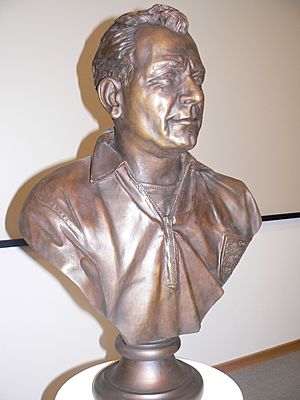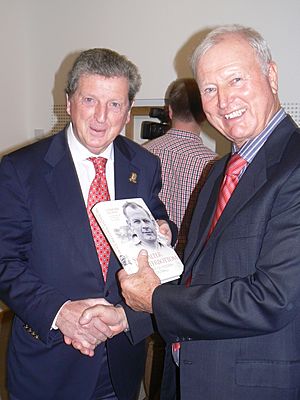Walter Winterbottom facts for kids
| Personal information | |||
|---|---|---|---|
| Full name | Walter Winterbottom | ||
| Date of birth | 31 March 1913 | ||
| Place of birth | Oldham, England | ||
| Date of death | 16 February 2002 (aged 88) | ||
| Place of death | Guildford, England | ||
| Position(s) | Half-back | ||
| Youth career | |||
| Manchester United | |||
| Senior career* | |||
| Years | Team | Apps | (Gls) |
| 1936–1938 | Manchester United | 26 | (0) |
| Managerial career | |||
| 1946–1962 | England | ||
| 1952 | Great Britain | ||
| *Club domestic league appearances and goals | |||
Sir Walter Winterbottom (born March 31, 1913 – died February 16, 2002) was a famous English football player and coach. He made history as the very first manager of the England national team, leading them from 1946 to 1962. He also worked as the Director of Coaching for The Football Association (the FA), which is England's football governing body.
After leaving the FA in 1962, he became the General Secretary of the Central Council of Physical Recreation (CCPR). In 1965, he was chosen as the first Director of the Sports Council. Walter Winterbottom was knighted in 1978 for his great work in sports. This means he was given the title "Sir" by the Queen. The Football Association honored him in 2013 with a special statue at St Georges Park, celebrating his huge impact on English football.
Contents
Who Was Sir Walter Winterbottom?
Walter Winterbottom was born in Oldham, England. His father worked with textile machines. At 12, Walter won a scholarship to Oldham High School, where he did very well. He then earned a bursary to Chester Diocesan Teachers Training College and became a top student in 1933. He started working as a teacher in Oldham.
While teaching, he played football for local teams like Royton Amateurs and Mossley. That's where Manchester United noticed him. In 1936, he signed with Manchester United as a part-time professional player, but he kept teaching. In his first season (1936/37), he played 21 games for the first team. Sadly, a spinal disease, called ankylosing spondylitis, ended his playing career early. He later left teaching to study at Carnegie College of Physical Education in Leeds and became a lecturer there.
During World War II, Walter Winterbottom served in the Royal Air Force. He became a wing commander and was in charge of training physical education instructors. He also played for Chelsea as a guest player and ran coaching courses for the FA. In 1946, Stanley Rous, the FA's secretary, convinced the FA to make Winterbottom their first Director of Coaching. He also suggested that Winterbottom should be the first manager of the England team.
Leading the England Football Team
Walter Winterbottom holds many records as England's manager. He was the first, youngest, and longest-serving England manager. He's also the only England manager who didn't have any professional managing experience before taking the job.
During his time, England played 139 matches, winning 78, drawing 33, and losing 28. They scored 383 goals and conceded 196. At home, England lost only six matches in 16 years! They won the British championship 13 times while he was in charge. England qualified for the World Cup four times, reaching the quarter-finals twice.
Even though he was the manager, Walter Winterbottom didn't pick the team himself at first. A special committee chose the players. But over time, his knowledge of football tactics helped him influence their choices. Eventually, before Alf Ramsey became manager in 1962, Winterbottom convinced the FA that the manager should have full control over team selection.
Winterbottom often warned that other countries in Europe and South America were getting better at football. He believed English football needed to change. His 16 years as manager helped make the national team more modern and competitive. Just four years after he left, England won the World Cup in 1966. He also started new teams like England B, Under 23, youth, and schoolboy teams. This gave young players experience before joining the main England team.
Some big wins during his time included beating Portugal 10-0 in 1947 and Italy 4-0 in 1948. They also beat West Germany 3-1 in 1954 and Scotland 9-3 in 1961. Some tough losses were against the Republic of Ireland (2-0) in 1949 and the USA (1-0) in the 1950 World Cup. A famous defeat was the 6-3 loss to Hungary at Wembley in 1953, which was England's first home loss to a foreign team. They lost to Hungary again 7-1 in 1954.
While he was manager, England also visited many countries for the first time, including Argentina, Brazil, and the Soviet Union.
England's World Cup Journeys
Walter Winterbottom led England to four World Cup finals in a row. This is a record only matched by Helmut Schön of West Germany.
- 1950 World Cup in Brazil: England entered the World Cup for the first time. They qualified by winning the British Home Championship. They beat Chile 2-0 but then lost 1-0 to the USA and 1-0 to Spain. This meant they were out in the first round.
- 1954 World Cup in Switzerland: England qualified again by winning the British Home Championship. They drew 4-4 with Belgium and beat Switzerland 2-0. They reached the quarter-finals but lost 4-2 to Uruguay, who were the champions at the time.
- 1958 World Cup in Sweden: England qualified with wins over the Republic of Ireland and Denmark. The team had only lost one game in 17 matches before the tournament. However, three months before the World Cup, the Munich air disaster happened. This tragic event caused the death of key players from Manchester United, including Roger Byrne, Tommy Taylor, and Duncan Edwards. England drew with the USSR, Brazil, and Austria but lost to the Soviet Union in a playoff.
- 1962 World Cup in Chile: Winterbottom led his team to qualify again with wins over Portugal and Luxembourg. England got out of their group but were beaten 3-1 by Brazil in the quarter-finals. Brazil went on to win the tournament.
Coaching English Football
Even though he was famous as England's manager, Walter Winterbottom made huge contributions to English football through his coaching work. He believed his role as Director of Coaching was even more important than managing the national team.
When he joined the FA in 1946, many people in football didn't think coaching was important. But Winterbottom was passionate about it. He had a clear idea of how coaching should grow. He quickly set up a national coaching program with summer courses at Lilleshall. He convinced some of his international players to take these courses, which led to official FA coaching badges. This made the program very respected.
These coaches then taught in schools and worked part-time in junior football clubs. Winterbottom gathered a team of young FA staff coaches, including famous names like Bill Nicholson, Don Howe, Ron Greenwood, and Bobby Robson. Over time, new types of managers appeared in League clubs, and they started to change how people thought about coaching.
Winterbottom's courses grew to include professional players, referees, teachers, and youth leaders. The number of qualified coaches increased every year. His courses also attracted people from other countries, and he was seen as a top expert in football coaching worldwide. He gave lectures internationally.
He inspired a new generation of managers, especially Ron Greenwood and Bobby Robson. Both of them went through all levels of coaching and later became England team managers themselves.
Helping Sport Across Britain
In 1962, Walter Winterbottom left the FA. He became the General Secretary of the Central Council of Physical Recreation (CCPR). Two years later, he became the Director of the new Sports Council. He started working on a bigger scale, having a major impact on sports across Britain in the second half of the 20th century.
His Work with the Sports Council
At the CCPR, Winterbottom worked to provide coaches and better facilities for sports organizations. He got involved in discussions about setting up a Sports Council to give government money to sports. He supported this idea.
In 1965, the government created the Sports Council, and Winterbottom became its first Director. He strongly believed that taking part in sports was very important for society. For 16 years, he fought to get more money for sports from the government and local councils. He wanted to support a "Sport for All" campaign.
Even with tough economic times, great progress was made in building new sports facilities. In ten years, 499 sports centers and 524 new swimming pools were built. Under his leadership, sports organizations became more professional and provided more coaches. He also came up with the idea of the Sports Aid Foundation, which raised money from businesses to help young, talented athletes who had a chance to win Olympic medals.
He was also part of the Council of Europe and helped make the "Sport For All" idea popular in Canada and with UNESCO.
Later Years and Legacy
In 1978, at 65, Walter Winterbottom retired from the Sports Council. He was knighted for his services to sport. He then advised the British government on how British sports equipment makers could work with foreign companies. In 1979, he visited Australia and New Zealand to help their governments support community sports.
He was also a key member of the FIFA Technical Studies Group for the World Cup in 1966, 1970, 1974, 1978, and 1982. In 1985, "The Winterbottom Report" was published. This was an FA investigation into artificial playing surfaces. From 1987 to 1989, he was part of another inquiry into artificial pitches for the Football League.
Sir Walter Winterbottom passed away on February 16, 2002, at the age of 88, after an operation for cancer. A memorial service was held for him in Cranleigh, Surrey.
Walter Winterbottom's Football Stats
| Team | Nat | From | To | Record | |||||||
|---|---|---|---|---|---|---|---|---|---|---|---|
| G | W | D | L | GF | GA | +/– | Win % | ||||
| England | September 1946 | July 1962 | 139 | 78 | 33 | 28 | 385 | 195 | +190 | 56.12 | |
Awards and Championships
- British Home Championship
- Champions: 1947, 1948, 1950, 1952 (shared), 1953 (shared), 1954, 1955, 1956 (shared), 1957, 1958 (shared), 1959 (shared), 1960 (shared), 1961
- Runners-up: 1949, 1951
Literature
- Graham Morse: Sir Walter Winterbottom - The Father of Modern English Football, Kings Road Publishing, 2013.
See also
 In Spanish: Walter Winterbottom para niños
In Spanish: Walter Winterbottom para niños
 | Leon Lynch |
 | Milton P. Webster |
 | Ferdinand Smith |



